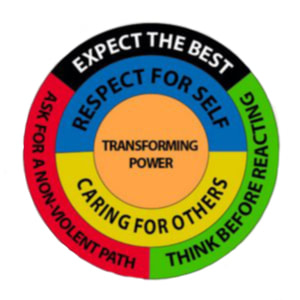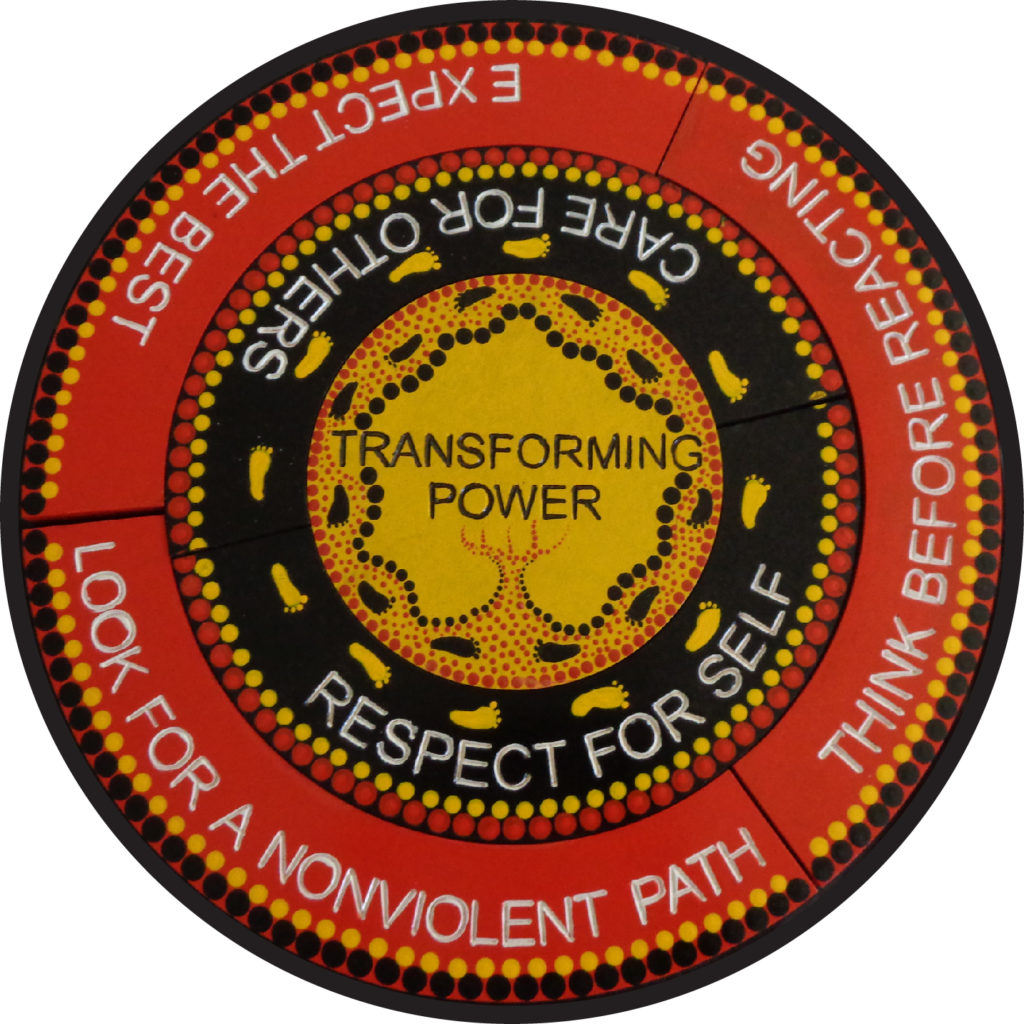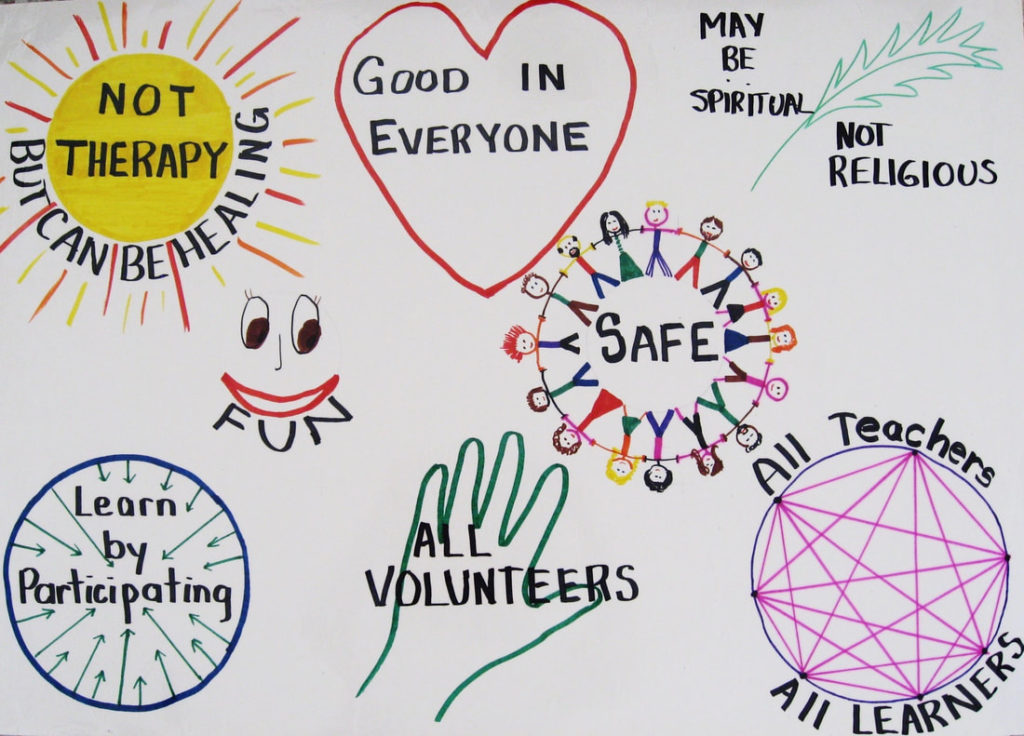The Alternatives to Violence Project (AVP) is an international network of independent not-for-profit grass-roots volunteer groups offering experiential workshops on self-awareness and creative conflict transformation in prisons, schools, and the wider community. Each state or territory has unique ways organising as well as differing workshop dates. Choose your state/territory and find out more about what is happening in your state.
AVP is a program of experiential workshops, helping people change their lives. It is the following:
- A community program, offering a new approach for community groups, social service agencies, youth organisations and individuals who would like to learn
- A school program, called the Help Increase the Peace (HIP) or the Help Increase the Peace Project (HIPP) offering a new approach to teachers, counsellors and students on conflict resolution skills
- A prison program, helping inmates learn new skills and attitudes that can help lead to fulfilling and nonviolent lives
- A personal program, using our own experiences to explore how we personally respond to other people and to consider new ways of relating to others (the focus is not on dealing with or mediating other people’s conflicts), and an intensive learning experience.
- A program for everybody, drawing its participants and its facilitators from all faiths, cultures, races and walks of life.
These workshops empower individuals to liberate themselves and others from the burden of violence. The fundamental belief of AVP is that there is a power for peace and good in everyone, and that this power has the ability to transform violence. AVP builds on a spiritual basis of respecting and caring for self and others.
There are three levels of AVP workshops. In the Basic workshop, the group progressively explores the AVP ‘building blocks’ of conflict transformation, and applies them to realistic scenarios, usually using a role play. The Advanced workshop explores a consensus process and then explores the selected topic to greater depth. The Facilitator Training workshop is for persons that have completed their basic and advanced and are interested in becoming a facilitator of AVP groups. We also occasionally hold Special Topic workshops, such as a two-day Trauma Awareness workshop.
There are now regular online workshops.

Basic Workshop
Advanced Workshop
The Basic AVP workshop focuses on self-awareness, attitudes and skills which help resolve conflicts.
Step-by-step experiences and exercises explore:
• Affirmation – building self-esteem and trust
• Community Building – establishing and nurturing connections with others in a group
• Communication – improving both listening skills and assertive methods of expression
• Co-operation – developing co-operative attitudes that avoid competitive conflicts
• Trust – developing confidence to share and to change
• Creative Conflict Transformation – getting in touch with our inner power to transform situations and ourselves
AVP workshops seek to assist individuals in personal growth and change. AVP is not therapy or counselling. Workshops are usually limited to between 10 and 15 participants.
The Advanced AVP workshop focuses on situations and factors that contribute to conflict.
Some of the common themes explored are:
Fear – reveals the hidden fears that underline anger, jealousy and prejudice
Anger – results in a deeper understanding of the personal situations that trigger anger
Communication – develops communication skills and the ability to communicate in tense and stressful situations
Stereotyping – builds awareness of stereotyping, bias and prejudice in personal relations
Power and Powerlessness – helps individuals understand power structures and get in touch with their inner power
Shame
Relationships
Addiction
Forgiveness – builds the groundwork for true reconciliation and freedom from guilt.
Participants must have completed a Basic Workshop.
Facilitator Training Workshop
Online and Special Topic Workshops
People who have completed both a Basic Workshop and an Advanced Workshop can apply to do a Facilitator Training Workshop which begins the process of becoming a facilitator. You don’t need to have any formal qualifications or experience. You need to have completed the other workshops and be willing to put AVP into practice in your every day life.
In response to COVID19 AVP now regularly offers online workshop, including all three levels of workshops. At the moment the online workshops are being organised by AVP in Sydney.
AVP sometimes runs special topic workshops, such as a 2 day Trauma Awareness Workshop. If you are interested in learning more about our specialised topic workshops, please contact us.
About AVP
Our history and philosophy


History
Philosophy
The Alternatives to Violence Project began in 1975 with a group of inmates, the Think Tank, in a New York prison who were working with youth gangs and young offenders. They asked some visiting Religious Society of Friends (Quakers) to help develop workshops exploring nonviolent relationships.
The process they used grew out of the nonviolence principles and experiential learning methods developed to train marshals in how to keep peace marches and demonstrations nonviolent during the Civil Rights Movement and Vietnam Moratorium campaigns. They also drew on the experience of the Children’s Creative Response to Conflict (CCRC) program which was using experiential learning processes for teaching nonviolent conflict resolution to primary school students.
By 1987 there were 150 workshops in prisons a year in New York and New Jersey. Gradually the program spread across the United States and workshops were held in more than 40 states. The program expanded to Canada and gradually spread around the world. There are now AVP programs in more than 60 countries in across every continent and region. As the program spread the workshops were increasingly held in many varied communities and in schools and higher education institutions.
In 1990, the AVP program was brought to Australia by the Quakers, when Stephen Angell, an AVP facilitator from New York, ran the first Australian AVP workshop in Queensland. AVP in Australia has been steadily growing ever since, and is now a network of grass-roots volunteer organisations in each Australian state and territory. Australian AVP workshops are held in the community, in prisons, in schools, and with refugees.
How does AVP work? AVP is based on several insights:
- Within each of us, there is a power for good and a potential to transform conflict
- In any situation, there are nonviolent alternatives to violent responses to conflict.
- Every culture has its own range of nonviolent alternatives to violence in response to conflict.
- Each of us has the option to choose our response to each experience of conflict.
The key features of AVP workshops are:
- Voluntarism – no one participates on a mandated basis, and the facilitators are unpaid volunteers
- Teamwork – there is always a team of serveral facilitators of diverse background and life experience, with shared leadership and no guru
- Diversity – the participants come from a range of ages, cultures, walks of life, and interests.
- A safe learning environment is maintained by group agreement –
- No putdowns
- Affirm oneself and others
- Listen and don’t interrupt’
- Respect confidentially
- Volunteer oneself only, speak from the ‘I’
- Everyone has the right to pass if that is the right thing for them at that time
- Reliance on Transforming Power
- Experiential rather than conceptual focus
- A holistic focus, recognising the spiritual dimension of the person, rather than a behaviouristic or rigidly rule-governed focus
- Building community is an integral part of the workshop process
- Fun and laughter is an integral part of the workshop process
- A varied pace, generally brisk, but with time for reflection
- Feedback throughout the workshop, with session evaluation and activity debriefing.
AVP internationally
Find out more about AVP around the world at https://avp.international/ . There is also a collection of research and related articles at https://avp.international/literature/.
Several members of AVP also have a strong connection with Friends Peace Teams, who work worldwide to develop long-term relationships with communities in conflict to create programs for peacebuilding, healing and reconciliation. Find out more about Friends Peace Teams at https://friendspeaceteams.org
AVP USA also has an extensive webpage at https://avpusa.org/ as does AVP California.
